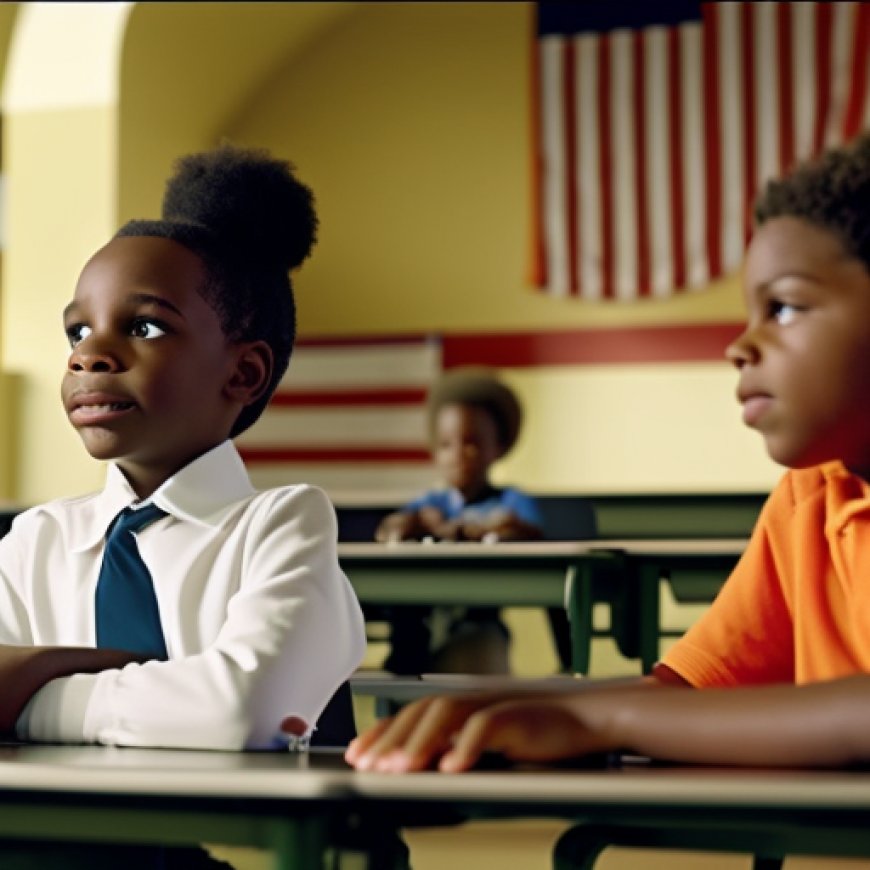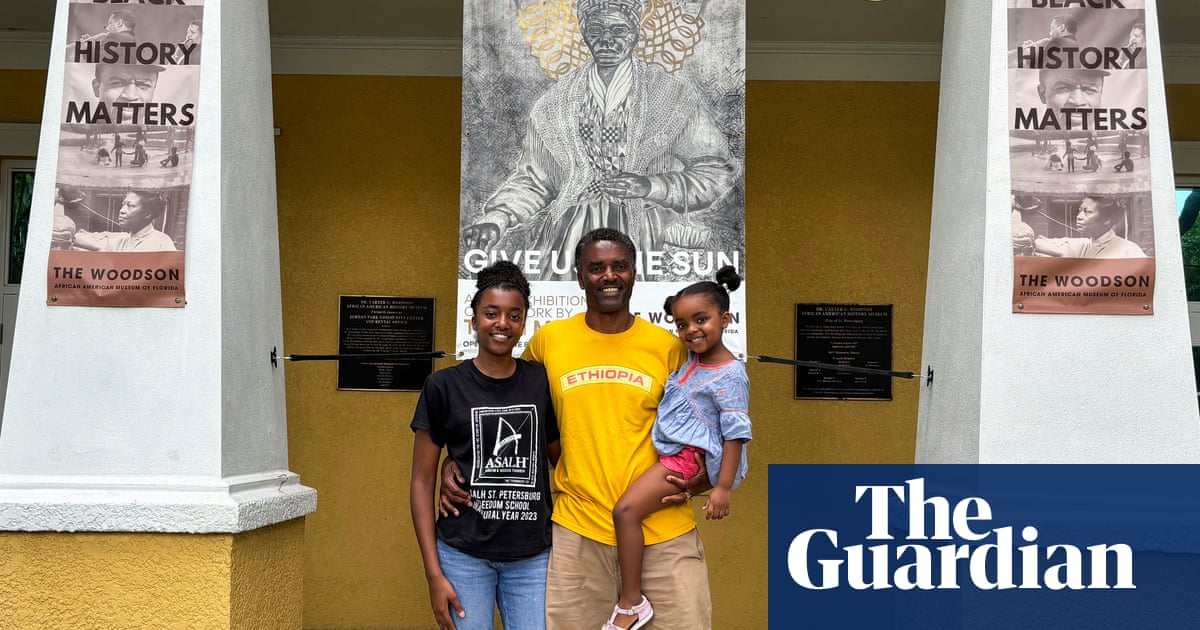Ron DeSantis banned lessons on racism in Florida public schools. ‘Freedom schools’ fill the gaps


Florida Freedom Schools: Preserving Black History Education

Introduction
“When I say, ‘because’, you say: ‘Black people invented it,’” Renee Scott Best told a class of predominantly Black students one Monday last month. The call and response from the kids grew louder as they read a fictional story about a dystopian world without African Americans and their inventions. A folding bed, tricycle, clock, toilet, heating furnace, thermostat and air conditioner were among the innovations that no longer existed because, “Black people invented it,” the students shouted.
The Importance of Black History Education
The class Best teaches is part of an educational initiative launched in 2023 by the Association for the Study of African American Life and History (ASALH), a Black heritage academic club founded in 1915 by historian Carter G Woodson. Known as a “freedom school”, the class was formed in response to what critics call an assault on Black history in Florida public schools launched by Ron DeSantis. The Republican governor’s Stop Woke Act prohibits schools from teaching about structural racism or using educational material from The 1619 Project, and he’s also banned advanced-placement African American history courses.
The State of Black History Education in Florida
While state statute still requires the teaching of African American history in Florida’s public schools, only 11 out of more than 60 districts have a Black history teaching plan advertised in curriculum guides, according to the state board African American History Taskforce. And since last year, the state’s social studies standards have included instruction that enslaved people learned skills that “could be applied for their personal benefit”. Some students and instructors say that the governor’s policies have sowed a culture of fear.
The Role of Freedom Schools
The freedom school was in session over the course of two months this summer and held at St Petersburg’s Woodson African American Museum of Florida. Though the class sizes vary, 17 students between the ages of 11 and 17 were in class in early July. Each of the kids opts into the extracurricular class to supplement their school learning. According to its vision statement, the main focus of the educational initiative is to draw “from the Black activist-intellectual tradition, to build the institutional infrastructure for a progressive, redemptive program of study around the majesty and value of Black History”.
Curriculum and Impact
The curriculum varies nationwide, but largely relies on the multimedia textbook Black History 365, with some schools teaching youths and others focused on adults. Volunteer instructors including public school teachers, attorneys and Black history scholars also use primary source documents, newspaper clippings and their own books in classes. St Petersburg’s curriculum includes teachings on the origins of Africa, the enslavement of Africans, the Reconstruction period in the US following the civil war, Jim Crow policies and the resistance to white supremacy throughout history. The St Petersburg school has held a summer, winter and spring session and is in talks about developing another one in the winter of 2025.
The Impact of Florida’s Policies
Florida’s policies are particularly dangerous because they serve as model legislation for other conservative states, according to Trey Walk, a democracy researcher and advocate with Human Rights Watch. “If Florida’s laws are upheld in court appeals, it can create a more conservative precedent for neighboring states,” Walk said during a seminar on Florida’s censorship policies. In June, Human Rights Watch released a report on the state of Florida’s education called Why Do They Hate Us So Much?, which found that censorship laws like the Stop Woke Act harmed underrepresented communities in Florida’s public schools.
The Future of Black History Education
W Marvin Dulaney, ASALH’s president, sees it as ironic that “we’ve come full circle where … 22 states have passed 40-plus pieces of legislation to restrict the teaching of Black history in terms of its content and ban certain books that they’re afraid of.” He added: “So we decided with ASALH that we weren’t going to sit quietly and let them continue to miseducate our children.” The organization is currently working on grant funding to expand their program.
During the time of DeSantis, the freedom schools could serve as a “wake-up call” that history can be taken away, said Akil King: “Governors come and go. This could be a catalyst for African American history to always be taught.”
SDGs, Targets, and Indicators Analysis
1. Which SDGs are addressed or connected to the issues highlighted in the article?
- SDG 4: Quality Education
- SDG 10: Reduced Inequalities
- SDG 16: Peace, Justice, and Strong Institutions
The article discusses the assault on Black history in Florida public schools and the efforts of the Association for the Study of African American Life and History (ASALH) to provide education on Black history through freedom schools. This addresses the goal of quality education (SDG 4) by ensuring that students have access to accurate and inclusive education that includes the history and contributions of African Americans. The article also highlights the issue of reduced inequalities (SDG 10) by discussing the lack of teaching plans for African American history in many Florida school districts and the fear among teachers of facing consequences for teaching truthful history. Lastly, the article touches on the importance of strong institutions and justice (SDG 16) by mentioning the censorship policies and legislation in Florida that restrict the teaching of Black history and harm underrepresented communities.
2. What specific targets under those SDGs can be identified based on the article’s content?
- Target 4.7: By 2030, ensure that all learners acquire the knowledge and skills needed to promote sustainable development, including among others through education for sustainable development and sustainable lifestyles.
- Target 10.2: By 2030, empower and promote the social, economic, and political inclusion of all, irrespective of age, sex, disability, race, ethnicity, origin, religion, or economic or other status.
- Target 16.7: Ensure responsive, inclusive, participatory, and representative decision-making at all levels.
Based on the article’s content, the specific targets that can be identified are related to promoting inclusive and sustainable education (Target 4.7), empowering and promoting the inclusion of all individuals (Target 10.2), and ensuring inclusive and representative decision-making (Target 16.7).
3. Are there any indicators mentioned or implied in the article that can be used to measure progress towards the identified targets?
- Indicator 4.7.1: Extent to which (i) global citizenship education and (ii) education for sustainable development are mainstreamed in (a) national education policies; (b) curricula; (c) teacher education; and (d) student assessment.
- No specific indicators mentioned for Target 10.2.
- No specific indicators mentioned for Target 16.7.
The article does not explicitly mention indicators for Targets 10.2 and 16.7. However, for Target 4.7, the article implies the need to assess the extent to which education policies, curricula, teacher education, and student assessment incorporate global citizenship education and education for sustainable development. This can be used as an indicator to measure progress towards inclusive and sustainable education.
Table: SDGs, Targets, and Indicators
| SDGs | Targets | Indicators |
|---|---|---|
| SDG 4: Quality Education | Target 4.7: By 2030, ensure that all learners acquire the knowledge and skills needed to promote sustainable development, including among others through education for sustainable development and sustainable lifestyles. | Indicator 4.7.1: Extent to which (i) global citizenship education and (ii) education for sustainable development are mainstreamed in (a) national education policies; (b) curricula; (c) teacher education; and (d) student assessment. |
| SDG 10: Reduced Inequalities | Target 10.2: By 2030, empower and promote the social, economic, and political inclusion of all, irrespective of age, sex, disability, race, ethnicity, origin, religion, or economic or other status. | No specific indicators mentioned. |
| SDG 16: Peace, Justice, and Strong Institutions | Target 16.7: Ensure responsive, inclusive, participatory, and representative decision-making at all levels. | No specific indicators mentioned. |
Source: theguardian.com








